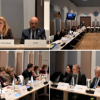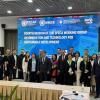News
Displaying Results 101 - 125 of 1293
UNECE and partners are working together to support North Macedonia in its green energy transition by building capacities to finance energy efficiency (EE) and renewable energy (RE) projects.
To this end, UNECE and UNDP organized two training sessions on design and verification of energy…
As countries seek to rapidly decarbonize their economies, investing in energy efficiency and the improved performance of buildings offers significant near term gains. Available measures can help transform the building and construction sector, which today is responsible for approximately 40% of…
In the UNECE region, the Fourth Cycle of Environmental Performance Reviews (EPR) kicks off with the review of Tajikistan, carried out for the fourth time under the leadership of UNECE.
A large, multidisciplinary team of international experts worked in Dushanbe from 6 to 15 November 2023,…
The European Commission has proposed a new legislation, the European Critical Raw Materials Act, to ensure a secure and sustainable supply of critical raw materials for the EU. The Act, on which the European Parliament and the European Council reached a provisional agreement on 13 November,…
Strong private sector engagement positively impacts the relevance, legitimacy, and credibility of national trade facilitation bodies (NTFBs) and encourages a business-centric approach to trade facilitation. Over the past several years, governments, donors and international organizations have…
On the World Day of Remembrance for Road Traffic Victims, the UN Road Safety Fund is launching the third edition of its #moments2live4 Campaign to put the spotlight on the hidden heroes of road safety.
As we ‘Remember, Act and Support’ the victims of road traffic crashes, the global Campaign calls…
In the pan-European region, citizens are feeling the impacts of climate change through extreme weather events. This undermines equitable access to water and sanitation as human rights, due to increasing water scarcity and increased burden of water diseases due to overflow of untreated sewerage…
Policy solutions for pressing problems like air pollution require sound data. Emission inventories can help in determining the major sources of air pollution in a given country.
As a result of integrated air pollution management strategies developed under the UNECE Convention on Long-range…
Global goals – just like regional and national goals — can only be achieved if we work together. This is a reason that revitalizing partnerships is at the heart of the Sustainable Development Goals (SDGs).
With this in mind, under the umbrella of the Regional Collaborative Platform, regional…
Transboundary rivers, lakes, and aquifers play a vital role in supporting the livelihoods of billions of people worldwide. Roughly 60% of global freshwater flow is in shared basins. About 40% of the world’s population lives in shared basins. The development and management of transboundary water…
Understanding how pollutant emissions will evolve in the future is essential for designing effective clean air policies today while taking into account the available resources in a given country.
While air quality in the UNECE region has improved over the past few decades as a result of…
Central Asia has significant untapped potential to decarbonize its energy systems and accelerate the sustainable energy transition, including through renewable energy development and enhanced resource management. To help the region capitalize on these opportunities, UNECE, the United Nations…
According to the 2023 Global Circularity Gap Report by the Circle Economy Foundation, transitioning to a circular economy will allow us to fulfil people's needs with only 70% of the materials we currently extract and use. The benefits of the circular economy are tremendous, as it not only addresses…
With a long history of reliance on resource-based industries for growth, countries of the United Nations Special Programme for the Economies of Central Asia (SPECA) - Afghanistan, Azerbaijan, Kazakhstan, Kyrgyzstan, Tajikistan, Turkmenistan, and Uzbekistan - have embraced the power of innovation…
Almost all of Botswana’s territory sits within transboundary rivers basins. Although landlocked, Botswana is therefore a ‘water-linked’ country. The Cubango-Okavango, Limpopo, Orange-Senqu and Zambezi Rivers all provide crucial freshwater arteries that supply people and nature, including the…
UNECE support for the revision of the Georgian Mining Code Act is shaping the future of resource classification and estimation standards in Georgia. During a workshop in Tbilisi participants discussed how Georgian standards could play a crucial role in harmonizing with the global dimensions of the…
Clothing production has doubled in the past 15 years. In 2018, the fashion industry produced around 2.1 billion tons of greenhouse gas emissions (GHG) – 4% of the world’s total – leading to major environmental, health and social challenges. In 2020 in Europe, textile consumption had the third…
Turkmenistan has made significant progress in increasing the share of the non-state sector in its GDP (excluding fuel and energy), which reached 71.1% in 2022. Public-Private Partnerships (PPPs) are considered by Turkmenistan as an important tool to further advance the implementation of the SDGs…
The Asia-Pacific region is home to some of the world's largest and most diverse reserves of minerals, energy, water, and biomass. The region accounts for around 70% of global mining production and consumption, including most of the world's bauxite, copper, iron, nickel, silver, tin, and zinc. …
Delegations from over 40 countries in the wider European region convened in Geneva on 19-20 October to review progress towards the goals adopted by the landmark 1994 International Conference on Population and Development (ICPD) and discuss priorities for the future.
The two-day conference,…
Forest ecosystems in the Caucasus, Central Asia and Eastern Europe are struggling with the complexity of changing climatic conditions, human and natural pressures threatening their vitality and resilience.
To address these challenges and promote sustainable forest management, data on forest…
An estimated 3.6 billion people face inadequate access to water at least a month per year – a figure expected to increase to more than 5 billion by 2050. According to WMO, over 50% of global catchment areas and reservoirs displayed deviations from normal conditions in 2022, of which the majority…
Sustainable and climate finance needs in Central Asia are considerable, with an estimated 38 billion US dollars per year up to 2030. On the other hand, the total foreign direct investment flows in the region in 2022 amounted to 10 billion US dollars. The infrastructure finance gap is therefore huge…
The ongoing repercussions of the COVID-19 pandemic, geopolitical instability, and elevated inflation rates continue to pose challenges to global trade, with the World Trade Organization (WTO)'s trade growth forecast now estimated at only 0.8% this year.
As the global trade landscape grapples…
The International Conference on Population and Development (ICPD), held in Cairo in 1994, set a bold new vision of the relationships between population, development, and individual rights and well-being. It recognized that population was not about numbers, but about people, and that individual…






















